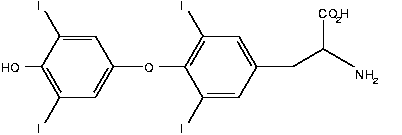Liothyronine Sodium
The thyroid hormones, thyroxine (T4) and triiodothyronine (T3), are tyrosine-based hormones produced by the thyroid gland. An important component in the synthesis is iodine. The major form of thyroid hormone in the blood is thyroxine (T4). This is converted to the active T3 within cells by deiodinases. These are further processed by decarboxylation and deiodination to produce iodothyronamine (T1a) and thyronamine (T0a). more...
Circulation
Most of the thyroid hormone circulating in the blood is bound to transport proteins :
- Thyroxine-binding globulin (TBG)
- Thyroid-binding prealbumin (TBPA) - this protein is also responsible for the transport of retinol, and so now has the preferred name of transthyretin (TTR)
- albumin.
Only a very small fraction of the circulating hormone is free (unbound) - T4 0.03% and T3 0.3%. This free fraction is biologically active, hence measuring concentrations of free thyroid hormones is of great diagnostic value. These values are referred to as fT4 and fT3. Another critical diagnostic tool is the amount of thyroid-stimulating hormone that is present. When thyroid hormone is bound, it is not active, so the amount of free T3/T4 is what is important. For this reason, measuring total thyroxine in the blood can be misleading.
Function
The thyronines act on the body to increase the basal metabolic rate, affect protein synthesis and increase the body's sensitivity to catecholamines (such as adrenaline).The thyroid hormones are essential to proper development and differentiation of all cells of the human body. To various extents, they regulate protein, fat and carbohydrate metabolism. But they have their most pronounced effects on how human cells use energetic compounds. Numerous physiological and pathological stimuli influence thyroid hormone synthesis.
The thyronamines function via some unknown mechanism to inhbit neuronal activity; this plays an important role in the hibernation cycles of mammals. One effect of administering the thyronamines is a severe drop in body temperature.
Related diseases
Both excess and deficiency of thyroxine can cause disorders.
- Thyrotoxicosis or hyperthyroidism is the clinical syndrome caused by an excess of circulating free thyroxine, free triiodothyronine, or both. It is a common disorder that affects approximately 2% of women and 0.2% of men.
- Hypothyroidism is the case where there is a deficiency of thyroxine.
Medical use of thyroid hormones
Both T3 and T4 are used to treat thyroid hormone deficiency (hypothyroidism). They are both absorbed well by the gut, so can be given orally. Levothyroxine, the most commonly used form, is a stereoisomer of physiological thyroxine, which is metabolised more slowly and hence usually only needs once-daily administration.
Thyronamines have no medical usages yet, though their use has been proposed for controlled induction of hypothermia which causes the brain to enter a protective cycle, useful in preventing damage during ischemic shock.
Read more at Wikipedia.org


